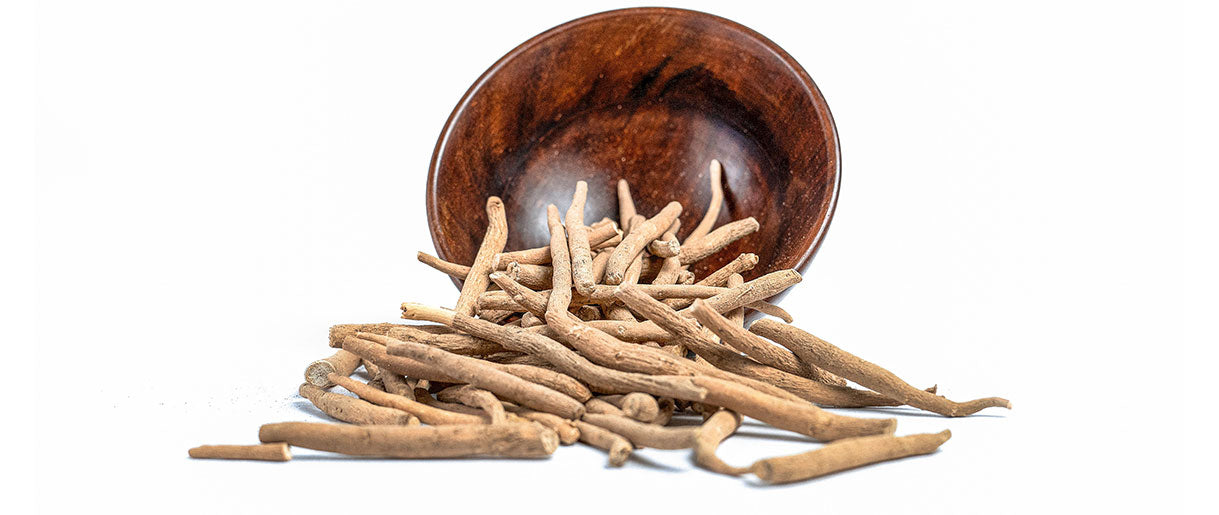Hey there! Are you tired of feeling like you're running on empty? Do you wish you could wave a magic wand and instantly boost your energy levels? Well, we've got some exciting news for you: Ashwagandha might just be the answer you've been looking for!
Imagine having a natural, powerful ally that optimizes your adrenal function and balances your stress hormones, unlocking a steady flow of energy that keeps you awake, alert, and ready to tackle anything that comes your way. That's exactly what Ashwagandha can do for you!
This incredible herb has been a staple in Ayurvedic medicine for centuries, and modern science is now backing up its energy-boosting properties. It's like having your own personal energy coach, working behind the scenes to keep you functioning at your best.
But how does it work? Picture Ashwagandha as a conductor, harmonizing your body's systems to create a symphony of vitality.
It helps you maintain steady energy levels throughout the day, so you can say goodbye to those frustrating crashes and slumps.
So, if you're ready to take your energy from "meh" to "wow," join us on a journey to discover the amazing potential of Ashwagandha.
5 Ways Ashwagandha Boosts Your Energy Levels
1. Regulates Stress Hormones
Ever feel like stress is the invisible thief stealing your energy? You're not alone.
When stress kicks in, our bodies pump out cortisol, the notorious energy-drainer. But here's a secret weapon: Ashwagandha, also known as Indian Ginseng.
This hero herb steps into the ring to battle stress and keep your energy levels where they should be.
- Stress vs. Energy: Think of cortisol as a party crasher. Too much, and your energy dips. Ashwagandha helps kick it out.
- Ashwagandha's Power: It's like a stress shield regulating your body's pesky stress hormones.
- Real Results: In placebo-controlled studies (1), folks taking ashwagandha root extract felt more zen and zippy—less stress, more energy.
- Extra Perks: Beyond fighting stress, Ashwagandha's health benefits have a ripple effect, boosting your overall well-being and energy.
So, next time stress tries to hijack your energy, remember Ashwagandha is your ally.
Not only does it help reduce stress and those annoying anxiety symptoms (2), but it also keeps your energy steady and strong.
2. Supports Adrenal Health

Did you know your adrenal glands are like tiny energy factories sitting on top of your kidneys? But when physical and mental stress hit the fan, they can get a bit out of whack, leaving you feeling drained.
That's where Ashwagandha steps in, ready to boost these little powerhouses. It's not just about feeling good; it's about charging up your performance from the inside out.
- Adrenal Support: Taking Ashwagandha helps support your adrenal health, ensuring they produce enough hormones for peak energy.
- Research Backing: Through placebo-controlled studies (3), evidence suggests that Ashwagandha can significantly improve physical performance and vitality.
So, think of taking Ashwagandha as giving your adrenals a little pep talk, encouraging them to keep up the good work. With research suggesting Ashwagandha's power-packed benefits for men and women, it's more than just an herb; it's your personal energy coach.
3. Enhances Thyroid Function
Your thyroid is like the maestro of your metabolism, conducting the energy orchestra in your body. But when it's out of tune, you might feel like you're dragging your feet.
Here's where Ashwagandha, also known as Indian Ginseng, plays its part. It's not just about giving you a boost; it's about fine-tuning your thyroid function for metabolic mastery.
- Thyroid Boost: Research suggests (4) that Ashwagandha can help enhance thyroid function, keeping those crucial thyroid hormone concentrations in harmony.
- Metabolic Impact: With the right circulating thyroid hormone concentrations, your metabolism (5) stays on beat, ensuring steady energy.
- Caution Note: While it's a hero, if you're on thyroid hormone medications or thyroid hormone pills, it's wise to chat with your doctor before adding Ashwagandha to your morning routine for energy.
So, think of taking Ashwagandha as tuning your body's energy instrument. It's not just about cranking up the volume; it's about hitting the right notes for a symphony of energy.
4. Reduces Physical and Mental Fatigue

Tackling fatigue is like trying to push through a thick fog, both physically and mentally. But guess what?
Ashwagandha, also known as Withania Somnifera in the world of alternative medicine, might just be your beacon of clarity. This remarkable herb is not about giving you a quick fix; it's about deeply rejuvenating your energy reserves.
- Targeting Fatigue: Ashwagandha root extract is known for significantly reducing both physical and mental fatigue, helping you stay alert and active.
- Quality Sleep: Good sleep is the unsung hero of energy. Ashwagandha supplements have been linked to improved sleep quality (6), setting the stage for better daytime energy and mental alertness.
- Scientifically Studied: Don't just take our word for it. In placebo-controlled studies (7), participants taking ashwagandha extract reported feeling more energetic and less burdened by fatigue.
So, if you're tired of feeling tired, consider Ashwagandha your natural ally. It's not just about pushing through the day; it's about awakening your best self with every sunrise, waking up with energy and staying energetic.
5. Improves Blood Sugar Control
Balancing blood sugar isn't just about numbers; it's about unlocking a steady flow of energy and enhancing your physical performance.
That's where the herbal supplement Ashwagandha comes into play, a prized Ayurvedic drug known for its natural prowess.
- Blood Sugar Balance: One of the most celebrated benefits of taking Ashwagandha supplements is their ability to help lower blood sugar levels. Stable blood sugar means more consistent energy and fewer crashes throughout your day.
- Integrate Wisely: If you're already on diabetes medications, a quick consultation with your healthcare professional is wise to ensure everything works harmoniously together.
- Overall Vitality: Ashwagandha offers a holistic approach to enhancing energy and vitality by improving blood sugar control (8) and boosting physical performance.
So, if you want to step up your energy game and power through your day with more strength and stability, consider exploring the benefits of Ashwagandha for women and men.
How to Use Ashwagandha for Energy

Looking to harness the full power of Ashwagandha for that much-needed energy boost? It's all about how you take it.
Whether you're a busy bee looking to stay on top of your game or someone exploring ways to enhance cognitive functions, here's how to get the most out of this ancient herb:
- Forms and Dosages: Ashwagandha comes in various forms—from ashwagandha root pills to powders. Typically, 300-500 mg of ashwagandha root and leaf extract is a common daily dose for most benefits, including reducing stress and boosting energy. But remember, everyone's different, so finding what works best for you is key.
- Timing is Everything: Many find taking Ashwagandha in the morning helps set a calm, energized tone for the day, especially if you're using it to combat stress and anxiety. Consider evening doses if it's sleep quality and relaxation you're after. And for those looking to boost cognitive functions or manage conditions like bipolar disorder, consistent timing is crucial.
- Dietary Considerations: Ashwagandha powder can be mixed into a morning smoothie or a warm, nighttime drink. It's versatile and generally well-tolerated with food. However, if you have specific dietary concerns or conditions, discussing them with a healthcare professional is always wise.
- Individual Needs: If you have specific conditions like bipolar disorder, a tailored approach under professional guidance is necessary to ensure safety and effectiveness.
Incorporating Ashwagandha into your routine could be your natural path to enhanced vitality and sharper mental function.
Just remember, while it's a powerful herb, it's part of a larger wellness picture. A balanced diet, regular exercise, and good sleep are all part of the energy equation.
FAQs About Ashwagandha For Energy
When Should I Take Ashwagandha For Energy?
The best time to take Ashwagandha for an energy boost is typically in the morning or early afternoon. Taking it early helps align with your body's natural rhythm, providing sustained energy throughout the day.
However, as everyone's response can vary, it's also wise to experiment under guidance to find the best timing for you. If you're also using it for improved sleep or relaxation, a smaller dose in the evening may be beneficial.
Can Ashwagandha Help Combat Fatigue And Low Motivation?
Yes, Ashwagandha is known to help combat fatigue and boost motivation by reducing stress, balancing cortisol levels, and enhancing overall vitality.
Its adaptogenic properties support adrenal health and energy metabolism, improving physical and mental endurance. As part of a healthy lifestyle, regular intake may lead to increased energy and a more motivated mindset.
Can Ashwagandha Help Improve Mental Focus And Clarity In Addition To Boosting Energy?
Yes, Ashwagandha can help improve mental focus and clarity and boost energy. It supports cognitive functions by reducing stress and anxiety, which can cloud thinking.
Its adaptogenic properties also help regulate cortisol levels, promoting a more balanced mental state conducive to focus and clarity. Regular consumption may enhance concentration and a sharper mind, but individual results can vary.
Key Takeaways
Embarking on the journey with Ashwagandha might just be your natural ticket to a life filled with more vigor, clarity, and resilience.
From regulating stress hormones to boosting your metabolism and combating fatigue, this ancient herb offers a treasure trove of benefits that align with the rhythms of modern life.
As you blend this powerful adaptogen into your daily routine, remember that the path to vitality is as unique as you are. Listen to your body, consult with healthcare professionals, and embrace the journey toward a more energized and focused you.
We'd love to hear from you! Whether you're curious about further benefits, have personal stories of transformation, or want to know more about integrating Ashwagandha into your life, leave a comment below.
References
- An investigation into the stress-relieving and pharmacological actions of an ashwagandha (Withania somnifera) extract: A randomized, double-blind, placebo-controlled study, (1), https://journals.lww.com/md journal/fulltext/2019/09130/an_investigation_into_the_stress_relieving_and.67.aspx
- Adaptogenic and Anxiolytic Effects of Ashwagandha Root Extract in Healthy Adults: A Double-blind, Randomized, Placebo-controlled Clinical Study, (2), https://www.ncbi.nlm.nih.gov/pmc/articles/PMC6979308/
- Can Ashwagandha Benefit the Endocrine System?—A Review, (3), https://www.mdpi.com/1422-0067/24/22/16513
- Efficacy and Safety of Ashwagandha Root Extract in Subclinical Hypothyroid Patients: A Double-Blind, Randomized Placebo-Controlled Trial, (4), https://pubmed.ncbi.nlm.nih.gov/28829155/
- The role of thyroid hormone in metabolism and metabolic syndrome, (5), https://pubmed.ncbi.nlm.nih.gov/32489580/
- Effect of Ashwagandha (Withania somnifera) extract on sleep: A systematic review and meta-analysis, (6), https://www.ncbi.nlm.nih.gov/pmc/articles/PMC8462692/
- Effects of Ashwagandha (Withania somnifera) on Physical Performance: Systematic Review and Bayesian Meta-Analysis, (7), https://www.ncbi.nlm.nih.gov/pmc/articles/PMC8006238/
- Protective effects of Withania somnifera root on inflammatory markers and insulin resistance in fructose-fed rats, (8), https://www.ncbi.nlm.nih.gov/pmc/articles/PMC4757043/










Let Us Know Your Comments